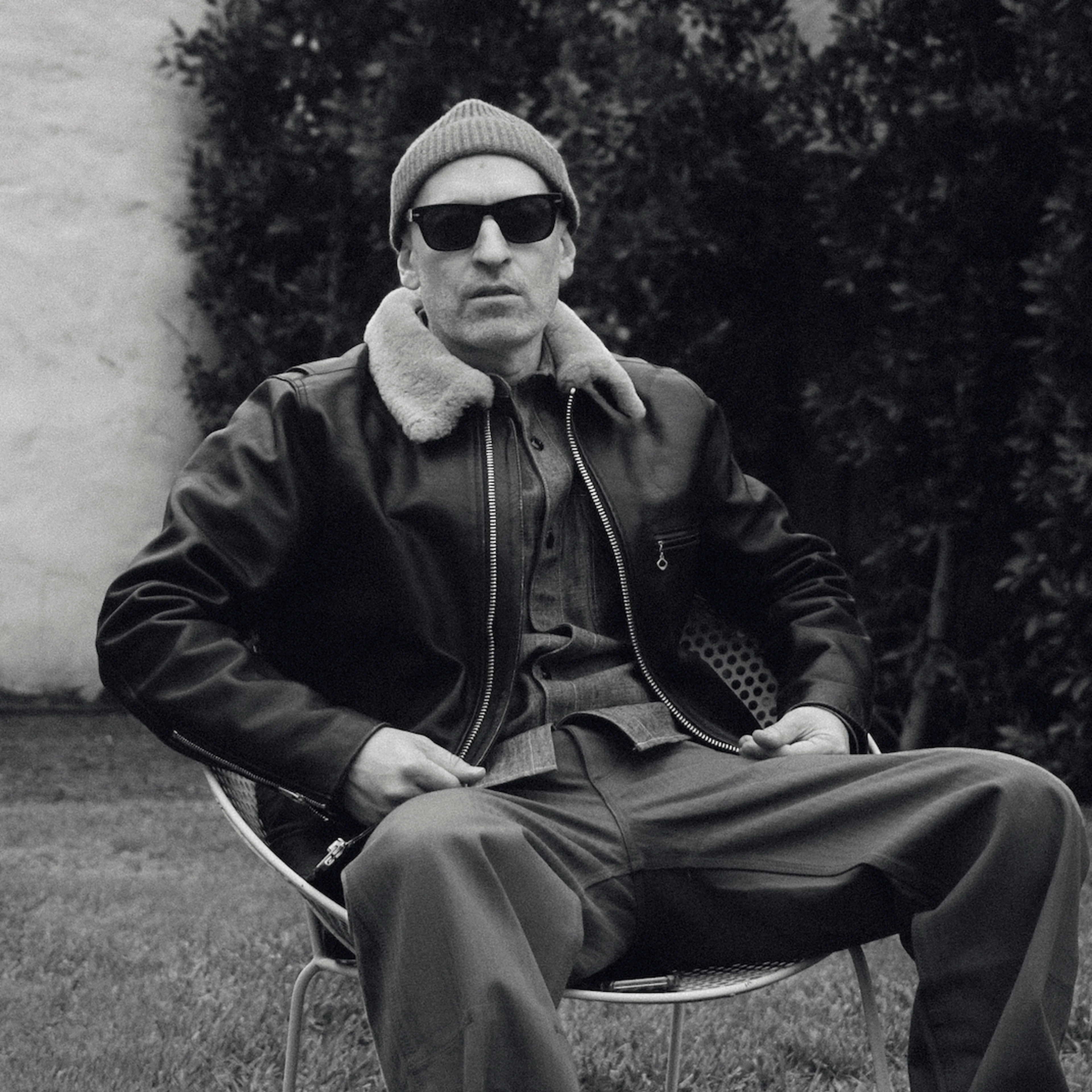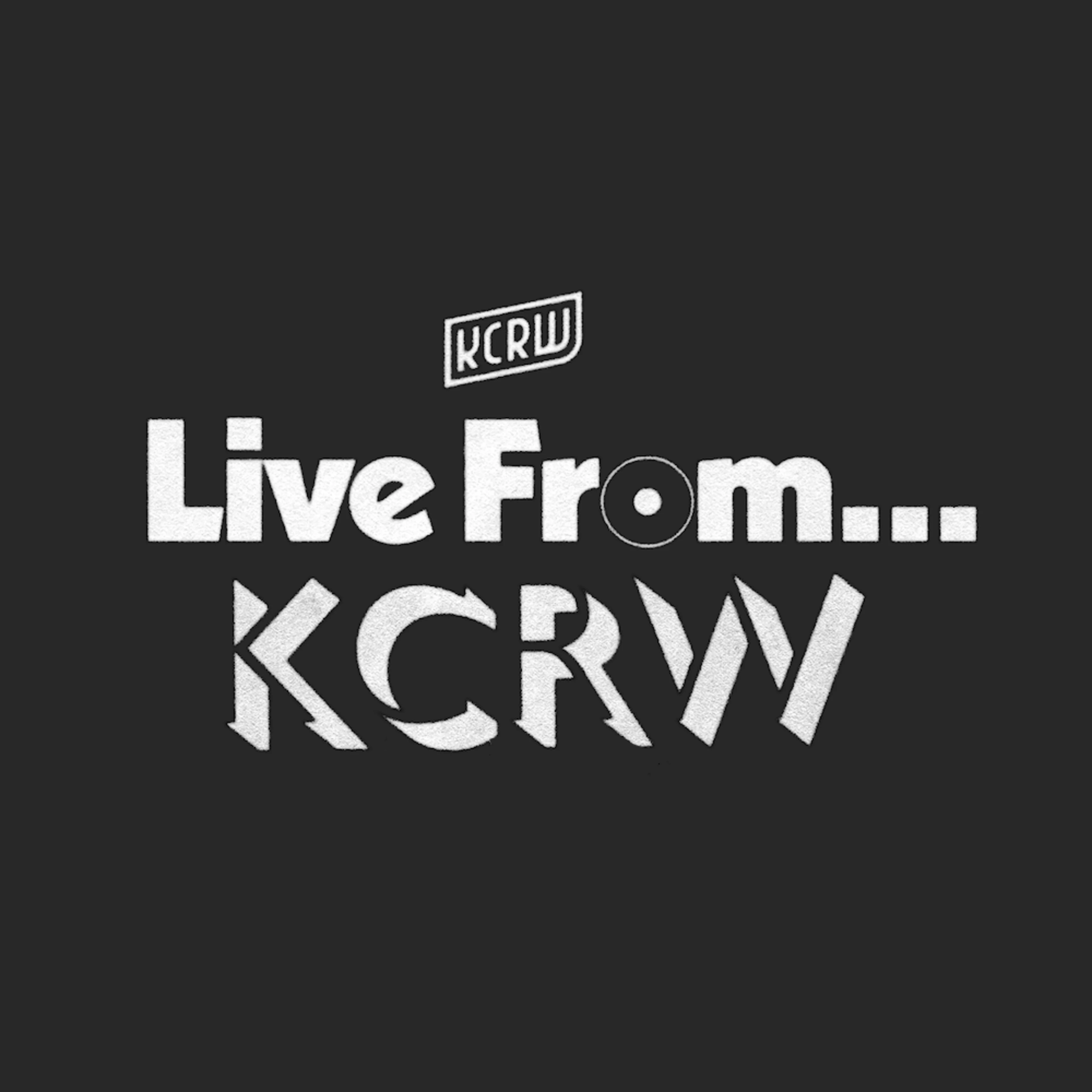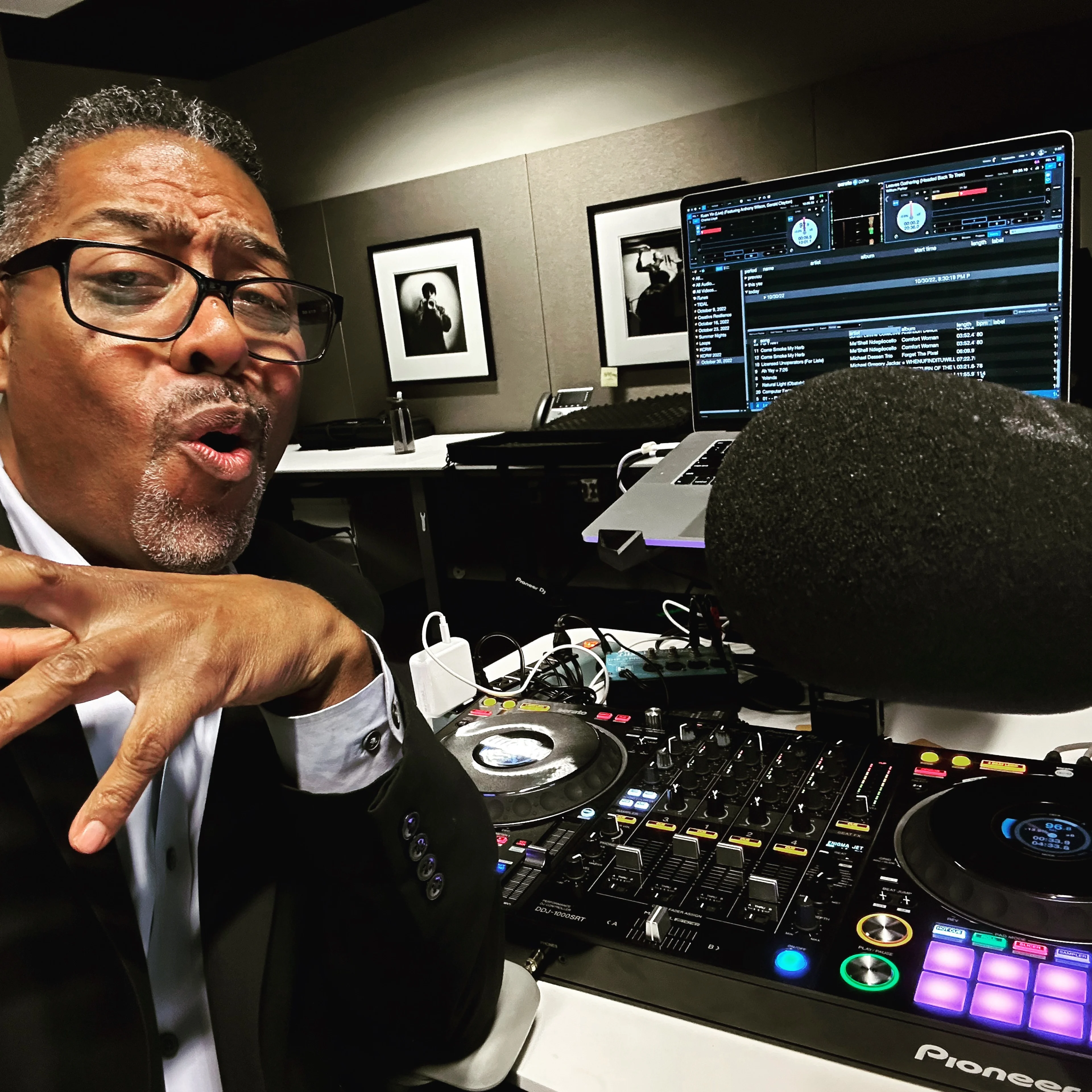Anthony Valadez and Novena Carmel welcome Tom Schnabel back to MBE

Tom Schnabel is considered a legend on these mean streets of Los Angeles. He's a music consultant, a historian and educator, and a curator for multiple music releases and compilations. He's been part of KCRW since 1977, and he served as the station's Music Director from 1979 to 1990.
Novena and I recently caught up with Schnabel just a few days before we started our tenure as Morning Becomes Eclectic hosts.
ANTHONY VALADEZ: Tom, I want you to take us back in time. What was LA like when you joined MBE? What did LA smell like during this time?
TOM SCHNABEL: (Laughs) I never really thought too much about that. I know that I zoomed around listening to a lot of different radio stations, always with a notepad in my car, always writing stuff down. I'm an omnivore, and I'm always searching for music. When I listened to KCRW, there was some good jazz on the station. I listened to everything. What was LA like? A lot of big, ugly cars; it was smoggier; there was less traffic. I have a friend who likes to watch “Columbo,” because you can see what LA looked like in the '70s with hardly any traffic.
NOVENA CARMEL: What was KCRW like when you got here? We're here in this big fancy building now, and I'm so curious about the KCRW you were introduced to.
TOM SCHNABEL: Well, people used to smoke in the studio, and in the office too, so it didn't smell like it does now. When I interviewed Ravi Shankar, my first interview for MBE, I scrubbed down the studio, put fresh flowers in, made everything smell nice. But, you know, it was not like it is now. The station was tiny, two rooms on a middle-school campus. David Was from Was (Not Was) said that at Robertson Boulevard, KCRW's signal faded out like a junkie on a $10 fix.
NOVENA CARMEL: So, with this tiny little signal, you were thinking, "There's something missing in Los Angeles radio." What was it that you were going to fulfill at the time?
TOM SCHNABEL: Well, there was a lot of good jazz music, and I've always loved jazz music. It was probably my first love. There was only classical music during the day, and then there was jazz at night. My first idea was to change that, and to start making it more eclectic. So the first show I put on was in September of 1979, and that was "Reggae Beat." The first guest was Bob Marley, who was very sick at the time. This was one of his last appearances anywhere. He was so ill from cancer that he couldn't pull his head up from the weight of the dreadlocks. And KCRW was already big enough, and had some amazing staff, even though we had a small signal, to be able to get Bob Marley to be the guest on this new show.
NOVENA CARMEL: That's amazing. Wow. So, speaking of song selections, we asked you today to share with us four of your all-time favorite songs ... which, I'm amazed that you could even pick that. The first song is from John Coltrane: "Impressions," specifically the 1963 studio version. Why did you pick this song?
TOM SCHNABEL: Well, my first musical epiphany with Coltrane was in my bedroom in my parents' home with the album "Impressions," which came out, I think, in 1963. And I sat in my bedroom and I listened to "India." Coltrane had studied with Ravi Shankar. So there was this long song, and I had an out-of-body experience. You know, I was straight; I was a surfer; I was a varsity swimmer. But I went out of my body. And at that point, I realized the power of music to go into your mind and create something almost otherworldly and incredibly pleasurable. And I didn't see it coming. So, Coltrane was my musical awakening. We're going to play a shorter version of "Impressions," because it was recorded live at the Village Vanguard, but the live version is like 15 minutes. We're going to hear a later one, a studio version that's only four minutes long, and it gets the point across.
ANTHONY VALADEZ: You know, Tom, there's a myth around the station that any time DJs left the country, they were forced to return with records from where they were. Is that true? And if not, how did the music library come about?
TOM SCHNABEL: There was no music library when I started. There were people who were stealing whatever records came in; they would just go home with them. So I put a stop to that. And I signed on to start building the library. When we started playing African music in 1980, I would ask people - if they went, for instance, to South Africa - to go to the Kohinoor Store in Johannesburg, whose slogan was "We Sell Records Like Cornflakes," and to bring it back, let us borrow it, whatever. And then all the Africans in town started coming over. There was a guy named Abdul Loughty Lasisi Amao, who was one of the lead people in Osibisa, the Ghanaian band funk band from the '70s. He brought stuff up. So we started building the library. And you know, we did get a lot of South African music. And when ["Reggae Beat" host] Roger Steffens was working for Warner Brothers and knew Paul Simon, Roger started sending him South African music from the library, putting it on cassette. And a few years later, "Graceland" came out. So, we started from nothing and started building a library. And I wanted the library to reflect the world.
ANTHONY VALADEZ: Speaking of the world, where are you taking us next with your song picks?
TOM SCHNABEL: Bembeya Jazz National is from Guinea in West Africa, and they're one of my favorite bands. I saw them once here at Grand Performances, and another time at a festival in Angoulême, France. I love their sound; I love the guitar player, Sekou "Diamond Fingers" Diabate. I think they were using Russian amps and guitars, because Russia was trying to get a foothold in West Africa right after the country became independent. So there's this kind of strange recorded sound and guitar sound. But I love this particular piece. This is from "The Best of the Syliphone Years," released by Stern's Records, and I just love this kind of '70s recording: not very good, but the music is magnificent.
NOVENA CARMEL: I'm curious if there are any misses. Were there records that you almost had your hands on? Was there an artist that you really wanted to interview that didn't happen?
TOM SCHNABEL: There were a few people I wanted to interview that I didn't. Baden Powell, who's next, is one of them.
NOVENA CARMEL: I hear there's an “almost-get" with Miles Davis as well. Is that right?
TOM SCHNABEL: Miles Davis swam at the Pepperdine pool in Malibu, the best Olympic pool in LA. And I'm a swimmer, and I was a competitive swimmer and a lifeguard. And I used to go up there; you could get a pass if you lifeguarded three days a year there. So I got the pass, and I was hoping to meet him up there.
I already knew what I was going to say, how I was going to introduce myself. I was going to tell him there was something wrong with his stroke, or how he could get his kick better. Because if I asked him, as a white dude asking Miles Davis a musical question, he'd blow me off in a second. But if I said, "Miles, you know, you could get more pull and more speed if you just cupped your hands a certain way," I would get there.
So you know, I'm waiting for him — he had a yellow Testarossa Ferrari. And so I was hoping I would hear it, and then I would know he was there and I would go into the pool and strategize. But he never came. However, a French friend of mine, a woman -- and you know, Miles loved France and he loved French women; he had a torrid affair with Juliette Gréco -- I said, "Benedict, if you're in the pool and Miles comes in, you have to go over and get his phone number. Go over and chat him up." So he came, she was in the pool. She went over, she met him, he talked to her, they went back and forth. But he was going on tour. He gave her his phone number, but by the time he got back and she called him, the number had changed. So that's as close as I ever got to Miles Davis.
NOVENA CARMEL: A great story nonetheless. I mean, swimming with him and everything, that might have been just as good as having an interview, in another sense. So, you mentioned Baden Powell earlier, who is a Brazilian composer/musician whom I love. What is it about this song, "Asa Branca," that stands out to you?
TOM SCHNABEL: "Asa Branca" has been done by many people. It's a Nordeste song, it's from up north [in Portugal], and I think it was written by Luis Gonzaga. It's about, you know, "The Earth is dry; the cows don't have anything to eat or any water, etc, etc." Baden Powell recorded this in Frankfurt, Germany. He spent a lot of time in Germany because he got more work there. Plus, the dictatorship in Brazil was not great; Caetano Veloso and Gilberto Gil spent a year in jail. So he left for Europe and did a lot of concerts. This is an absolutely spectacular version of this song, which he recorded many, many times. But this is my favorite.
ANTHONY VALADEZ: The next song you have queued up is from Puerto Rico, and the great Tito Puente. Tell us something about him.
TOM SCHNABEL: Tito Puente was beating the wall with spoons, and the neighbors told his mother, "Get the kid some drums. He's driving us crazy." He started in the 1930s, and he got so good that when World War II broke out, he was drafted, and he went on the USS Santee as an orchestra leader. And he was so popular as the arranger and bandleader of this orchestra -- which he put a lot of Latin stuff and clave into -- that when his tour of duty was over, the captain wouldn't let him off the ship. And he stayed through the whole war, and sailed into Tokyo Bay when the peace treaty was signed.
A funny story about "Oye Como Va," one of his big hits. Santana records it [in 1970]. And Tito at first is like, "Who is this kid, anyway? Who is this rock and roller recording my song?" And then he got the first royalty check, and was like, "Carlos, be my guest, come join me on stage, it's totally cool."
So this is a song called "El Que Usted Conoce." I love this song; it's not heard all that often, and I wanted to hear it.
ANTHONY VALADEZ: You know, Tom, Novena and I are honored to continue this legacy. But we want to ask you: moving forward, what advice do you have for us with MBE?
TOM SCHNABEL: Well, the first thing is keeping it eclectic. You have a big audience out there. It's not like a midnight show; it's not like being a club DJ. You have an audience, not only here, but all over the world. There are 200 languages spoken just here in LA. So try to represent some of that, because there are a lot of different things happening here. This is a great, great city. You want to keep it eclectic; go outside of your comfort zone. You need to challenge yourself and your listeners.
You know, when I first played Nusrat Fateh Ali Khan, there were complaint calls saying, "He's screaming, he's screaming, something's wrong with him." And people didn't know what the heck it was, but people got into it. Peter Gabriel, of course, helped with that. But in the end, he was playing the Universal Amphitheater for 5000 people. So in other words, what people don't like at the beginning, or seems odd, or seems foreign or whatever, people will glom onto it if it's good music.
So, I guess, just take chances. You know, people need other music besides dance music or house music -- maybe dance music from some other country. I would also say there are times for introspective, intimate music too. I used to play Ryuichi Sakamoto on a rainy day; sometimes I would play Debussy; Erik Satie would work perfectly well; those are classical people except for Ryuichi. So it's just such a huge opportunity for you guys. MBE is an incredible show, and you're going to be reaching a lot of people with different tastes, different attitudes. So I just say: surprise them with variety and unexpected pleasures.
NOVENA CARMEL: Thank you so much for that. That's amazing. I'll definitely take it all to heart. Tom, you have so much knowledge about music and playing music for people, and I know that you also have a birthday coming up. So I gotta ask, on the birthday tip: What's a great song to play on someone's birthday?
TOM SCHNABEL: I like "Don't Worry, Be Happy" by Bobby McFerrin. But I also like a song that preceded it and, I think, influenced it. It's called "Make It Do" by Slim Gaillard, who was one of the great fixtures in LA club music in the '40s. If you want to get happy for the rest of your lives, tune in some Slim Gaillard and you'll be doing fine.
ANTHONY VALADEZ: Thank you so much, Tom, on behalf of all the KCRW DJs. Every time I smell vinyl inside this building, it's because of you, and we just want to let you know that we love you, and happy birthday, and we're looking forward to hanging out with you more.
TOM SCHNABEL: I want to thank you and Novena for inviting me; thanks to Ariana and Anne, of course, and to Myke, for making this happen today. This has been a real pleasure for me.
View this post on Instagram
Show Credits
Continue Listening
See All- Morning Becomes Eclectic
More Shows
Jason Bentley's Metropolis
Capturing the hypnotic pulse of modern city life.Peanut Butter Wolf
Peanut Butter Wolf digs through his crates of over 50,000 records, as well as digital crates of tons of unreleased music, to favor the underdog.Eclectic24
KCRW's all-music channel blending the collected talents and tastes of all KCRW's DJs into a single voice streaming 24 hours a day.Live From KCRW
Intimate performances, fresh sounds, and candid conversations.LeRoy Downs
Exploring the multitudes contained within jazz.





